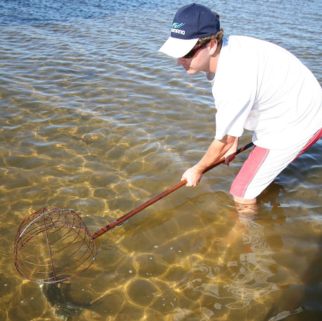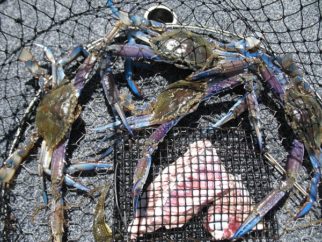The Facts:
– Recfishwest supports the Government in taking practical steps to improve safety measures related to sharks in WA
– In absence of evidence linking gillnet fishing to improved safety, Recfishwest will strongly oppose any attempt to re-introduce gillnet fishing to metropolitan waters
– Recent calls regarding positive public safety outcomes from gillnets are unfounded
– Waters Lancelin to Mandurah were closed to gillnetting in 2007 to protect Dhufish and Pink Snapper stocks (Figure 1 below)
– A $5 million dollar compensation package was made available to commercial fishers at the time by the state government
– Shark fishing with gillnets outside metro waters lands almost 1000 tons of sharks annually
Recfishwest cares deeply about public safety. The fishing community include those who enter the water spearfishing and diving and many others who go surfing, swimming and enjoy other aquatic recreational activities.
In November 2007 the then Minister for Fisheries, the Hon. Jon Ford, MLC announced the removal of gillnets from the metropolitan area following concern for the sustainability of iconic fish species such as Dhufish and Pink Snapper. This decision is still widely regarded by the recreational fishing community as the single most important and positive decision for recreational fishing by any Fisheries Minister.
Calls have been made for the reintroduction of the metropolitan shark fishery, by linking the 2007 closure to recent shark attacks. No evidence has supported these calls. Unsurprisingly Recfishwest has been inundated with correspondence from concerned fishers who are worried that the great fishery they have worked so hard to rebuild is about to be impacted by gillnets. Recfishwest firmly believe that there is no justification for gillnets in metropolitan waters and fought hard for many years for the removal of this particular fishing method.
This issue is of great importance to many fishers as gillnet fishing impacted on a number of important bottom fish species in the metropolitan area. The benefits of the decision to remove the nets are now starting to be seen with Dhufish stocks showing signs of recovery as supported by the latest scientific stock assessment.
The removal of gillnets from metropolitan waters was only one of a number of management measures across both the recreational and commercial sectors that were undertaken in 2007 to meet the sustainability challenges for Dhufish. The government provided millions of dollars in compensation to commercial fishers who were displaced. It is worth noting that fishing for sharks and finfish with gillnets has operated for decades North of Lancelin and South of Mandurah through to the SA boarder and continues to land almost 1000 tons of sharks and rays annually.
Recfishwest actively promotes boating and water safety initiatives as we believe all West Aussies should return home safe at the end of a day’s fishing. WA’s 140,000 recreational boat fishing licence holders have a role to play as eyes on the water especially in the early reporting of shark sightings to Water Police on 9442 8600.
We do not believe that the re-introduction of gillnets to metropolitan waters will improve public safety. We do not support a misguided attempt to solve one problem by creating another.
Recfishwest supports decisions based on science!
Map Courtesy of WA Department of Fisheries – STATUS REPORTS OF THE FISHERIES AND AQUATIC RESOURCES OF WESTERN AUSTRALIA 2014/15 (pg 269)

The following Media Release is from 2007 on behalf of then Fisheries Minister John Ford.
MEDIA STATEMENT NOV 2007
Metropolitan fishing closure will help sustainability of iconic fish
Thursday, 15 November 2007
Today marks the closure of commercial line and gillnet fishing in the Metropolitan Fishing Zone, between Lancelin and south of Mandurah, as part of a fishing reform package to ensure sustainability of fish for the future.
Fisheries Minister Jon Ford said a $5million compensation package will be available to buy-out commercial line and demersal gillnet fishers within the metropolitan zone.
Only about eight licence holders are expected to be fully impacted by the new ban, with other metropolitan zone fishers able to continue fishing in other parts of the West Coast Bioregion, which runs from Kalbarri to near Augusta.
Various commercial fisheries will still be allowed to operate in the metropolitan zone including the lobster fishery, purse seine fishing for sardines and the South West Trawl fishery which takes prawns, scallops and small fish.
Mr Ford said that although a handful of fishermen would be impacted by the ban, consumers should experience little if no impact from this Western Australian Government policy.
“Only about three per cent of demersal scalefish consumed in WA comes from the metropolitan zone, with 97 per cent of the supply coming from WA’s northern fisheries. So there should be very little if any change in prices,” he said.
“In any case, fish such as dhufish and pink snapper have been over-priced for most Western Australians for several years. But with better sustainability practices by this fishery, supply should improve in the long-term and prices should become more realistic.”
The Minister said the difficult decision to introduce the metropolitan zone fishing ban was necessary to ensure sustainability of iconic demersal scalefish such as dhufish and pink snapper.
“New research presented to me showed an immediate reduction in catches of key demersal scalefish, of about 50 per cent, was required to ensure the sustainability of these fish in the Metropolitan Fishing Zone,” he said.
“In making the decision, I considered the following points: The metropolitan zone attracts about two-thirds of all recreational fishing effort between Kalbarri and near Augusta; commercial catches of demersal species in the metropolitan zone accounts for about three per cent of the State’s entire catch of demersal scalefish; a shared reduction by commercial and recreational sectors was likely to have made the remaining commercial sector unviable; and compensation would be available for affected commercial fishers, while many metropolitan zone fishers will still able to operate outside of the metropolitan zone.
“Having considered these issues, I decided to remove all commercial line and gillnet fishing in this area. This decision is in keeping with the Integrated Fisheries Management that allows me to make allocation decisions, which can include the option of zero allocation.”
Mr Ford said that while the Metropolitan Fishing Zone was now effectively an exclusive zone for recreational fishing of demersal scalefish such as dhufish and pink snapper, he was not ignoring the fact that recreational fishing also had an enormous impact on fish stocks.
“Our current management arrangements such as bag limits are no longer sufficient to keep abreast with the increasing pressure on our fish stocks. That’s why we need a new and innovative management strategy for recreational fishing of demersal scalefish along the West Coast Bioregion,” the Minister said.
“The discussion paper I released in September invites the public to have their say about what this new management strategy should involve. Submissions close tomorrow, November 16, so I urge people to make their submissions. Your ideas will be very helpful in deciding the fate of recreational fishing.”
ENDS
 Recfishwest works tirelessly to protect, promote and develop sustainable, accessible, enjoyable and safe fishing for the benefit of the community. With the 2017 state election fast approaching Recfishwest is working to ensure fishers are given the acknowledgement and consideration they deserve.
Recfishwest works tirelessly to protect, promote and develop sustainable, accessible, enjoyable and safe fishing for the benefit of the community. With the 2017 state election fast approaching Recfishwest is working to ensure fishers are given the acknowledgement and consideration they deserve.

 The Peel-Harvey blue swimmer crab fishery is the most popular WA recreational fishery and also provides a livelihood for 10 commercial crab licence holders. Receiving this world-first certification ensures the longevity of this fishery and Recfishwest has been an enthusiastic supporter of the process, which protects and promotes sustainable and enjoyable fishing opportunities for the WA community.
The Peel-Harvey blue swimmer crab fishery is the most popular WA recreational fishery and also provides a livelihood for 10 commercial crab licence holders. Receiving this world-first certification ensures the longevity of this fishery and Recfishwest has been an enthusiastic supporter of the process, which protects and promotes sustainable and enjoyable fishing opportunities for the WA community.

